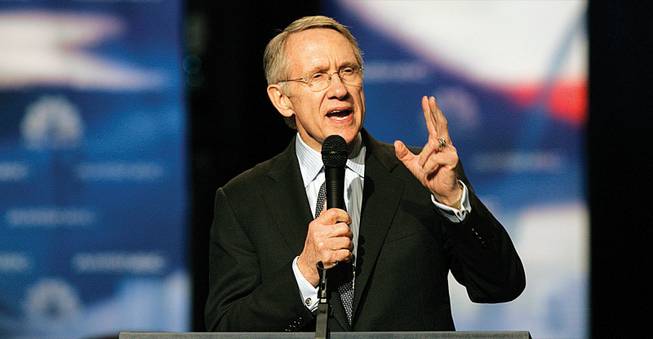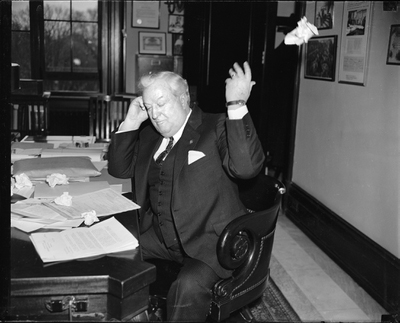
Sam Morris / Las Vegas Sun file
Senate Majority Leader Harry Reid is among the senators co-sponsoring legislation to overturn the McCarran-Ferguson act, saying it allows insurers to collude in setting prices.
Friday, Oct. 23, 2009 | 2 a.m.
Sun Coverage
Beyond the Sun
- The New York Times: House Panel Approves Bill Curbing Insurers’ Antitrust Exemption (10-21-2009)
- The New York Times: Obama Threatens Insurers’ Anti-Trust Exemption (10-18-2009)
- Health Reform Watch: Health Insurance, Competition & the McCarran-Ferguson Act (6-21-2009)
For decades the big, bronze statue of Nevada Sen. Patrick McCarran stood in the same place in the Capitol, just off the second-floor Statuary Hall, near the House speaker’s office.
Nevadans would sometimes meet there, an easily identifiable spot.
And then, suddenly, McCarran moved. As part of the opening of the Capitol Visitor Center almost a year ago, statues were rearranged and McCarran was deposited far away, on the Senate side of the Capitol, down the hall from the offices of Senate Majority Leader Harry Reid.
One couldn’t help but wonder: Was someone messing with the majority leader?
Reid has made no secret of his disdain for the stridently anti-communist Nevadan who served in the Senate from 1933 to 1954. McCarran, a Democrat, was allied with Republican Sen. Joe McCarthy in targeting their enemies by accusing them of harboring communist sympathies.
Now, in the midst of the health care reform debate, Reid is trying to do away with the Nevada senator’s namesake legislation that exempts the health care industry from antitrust laws.
What started as musings when Reid was home in August, complaining out loud that the insurance industry and Major League Baseball are the only two businesses that enjoy exempt status, has morphed into a cause célèbre.
Reid added his name to the list of senators co-sponsoring legislation to overturn the McCarran-Ferguson act. He made the unusual move of testifying on the bill at a recent Senate Judiciary Committee meeting.
On Wednesday he held a midday news conference with other senators and the head of the Consumers Union decrying the special status afforded health insurance companies.
“What a sweet deal they have,” Reid said recently.
Reid and others claim the antitrust exemption allows insurers to collude in setting prices instead of competing with one another. In Nevada a few insurance companies dominate the market.
“Although we’re both Nevadans, I’m not sure what Pat McCarran had in mind when he pushed this bill,” Reid said.
Reid has signed on to similar bills in past years, but congressional Democrats have stepped up the rhetoric against the insurance industry since its main lobby, America’s Health Insurance Plans, issued an eleventh-hour report last week critical of the Senate reform legislation before a crucial committee vote. The report warned that in 2019, a typical family’s insurance premiums could cost $4,000 more than predicted — but was widely dismissed by Democrats and other reform advocates as a scare tactic.
The industry had been playing nice until then — no “Harry & Louise” ads like those that helped derail an attempt at health care reform during the Clinton administration. But the report was a game-changer.
This week Reid upped the ante by announcing that the bill to overturn McCarran-Ferguson exemptions would be offered as an amendment once the massive health care bill now being negotiated is brought to the Senate floor. The House Judiciary Committee passed a similar measure this week.
The health care lobby is not pleased and has called such efforts a distraction.
“The focus on this issue is a political ploy designed to distract attention away from the real issue of rising health care costs,” Robert Zirkelbach, a spokesman for America’s Health Insurance Plans, said recently.
The industry says the exemption is not as extensive as critics claim, and companies are heavily regulated by state and federal agencies.
There may be some truth to the distraction claim.
The health industry antitrust exemption is not the main topic of debate in ongoing congressional negotiations over health care reform, just a reminder of what could be coming.
Reid remained undeterred, telling Nevada reporters in a midweek conference call that he hopes to have the massive reform bill passed from the Senate “in the next few weeks.”
Whether the insurance industry exemption will be part of that, rewriting Nevada history anew, remains to be seen.

